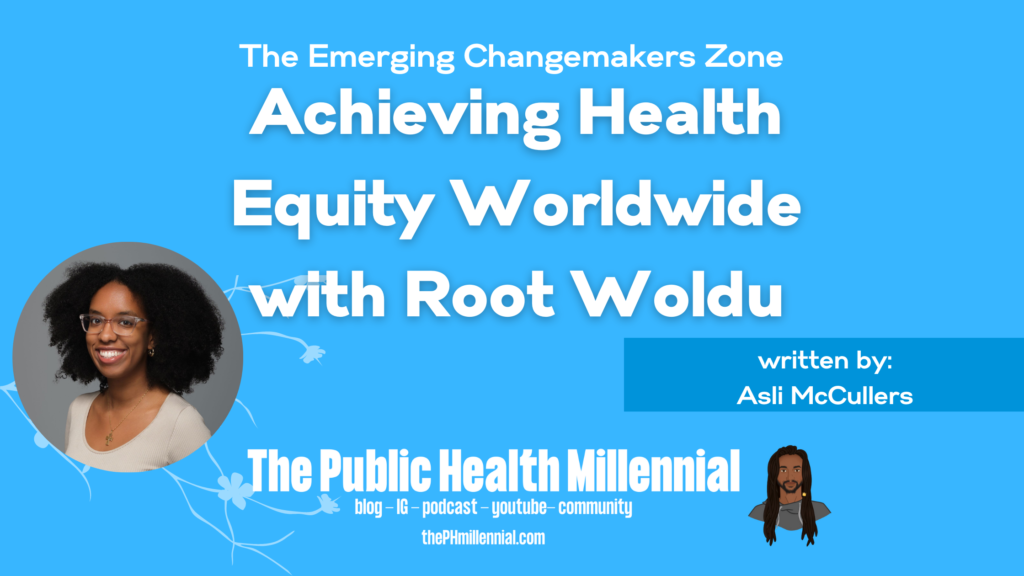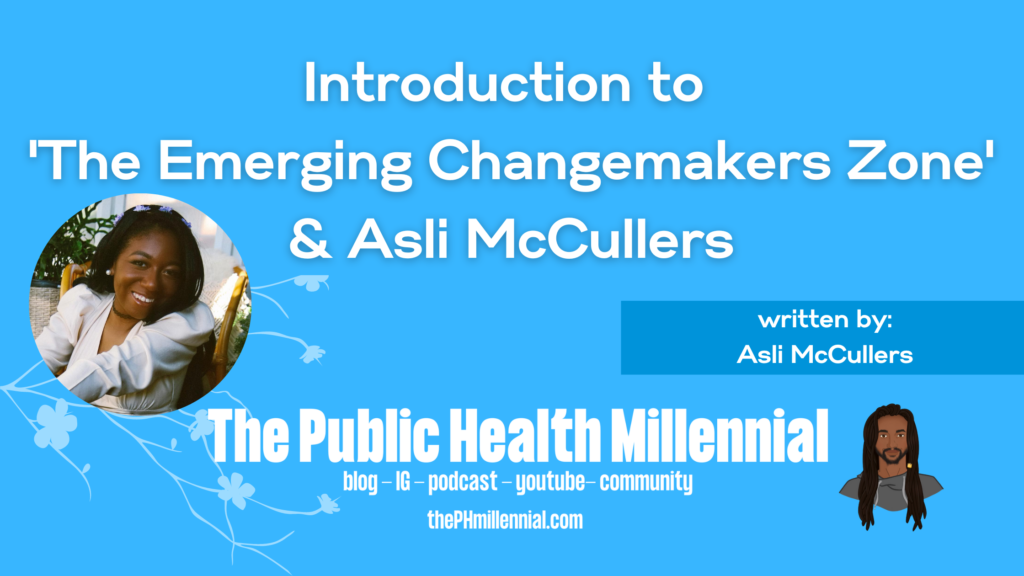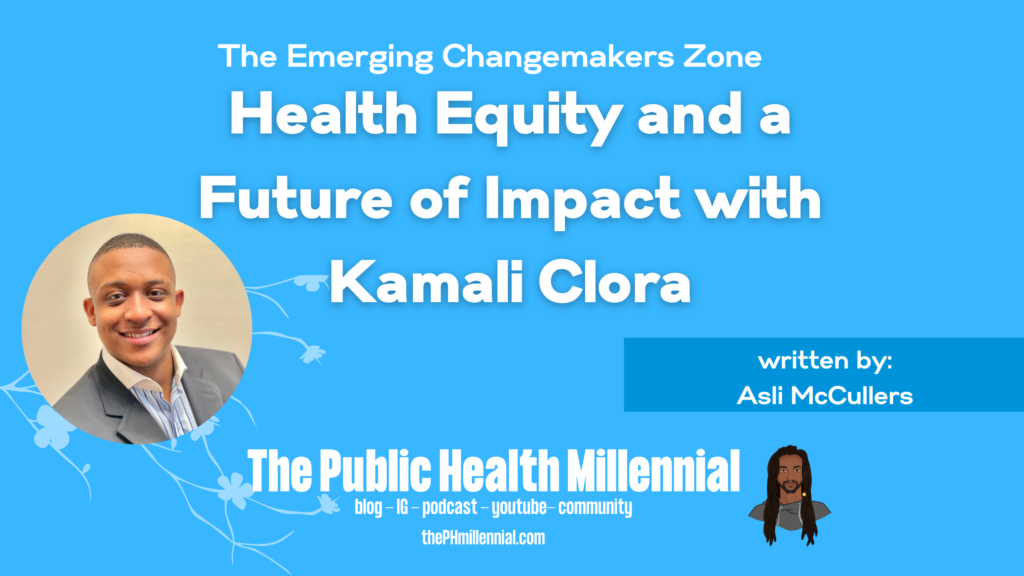Is global impact a part of your health equity vision? Root Woldu is a Masters of Public Health (MPH) candidate in Health Policy with a concentration in Public Health Leadership at Harvard University. She previously earned her Bachelor’s degree in Public Health Science at the University of Maryland, College Park. This conversation connects Root’s identity as a second generation American to her career aspirations, experiences across public health sectors, and the process of navigating an Ivy League setting.
A Generation of Change: From Family Lens to Global Lens
Like many of us changemakers, Root didn’t start out knowing exactly what “public health” really meant, sharing that she was only familiarized with it in early high school through a bio science program. She remembered; “…we watched the film Contagion. And I was like, Oh, my Gosh! What’s that? They were discussing epidemiological topics throughout the movie! And I was like, Oh, my Gosh! I want to do that!” I think I also remember seeing Contagion in a class at some point right before I jumped into public health–props to that movie for giving the future of public health their initial “whoa” moment, lol!
Root candidly shared how her lived experience as a child of Ethiopian immigrants inspired her to pursue her career with a lens that fully acknowledges the challenges for communities worldwide. On her beginnings in public health, she shared the following reflection;
“My parents are from the northern region of Ethiopia, called Tigray, and within that region there have been ongoing wars, conflicts. A lot of my family still lives there today. Seeing my family back home going through war, famine, or dealing with different types of illnesses definitely gave me that exposure to public health with a global lens. Being based in the United States, we will have family members immigrate to America, and we’ll take them to community health centers where they can get their vaccinations and medical care. From that I’ve always known I cared for health care, and that it’s always piqued my interests.”
Later in our conversation, I asked Root to share more on how the experience of navigating a space like Harvard was in any way impacted by her identity as a second generation American. She gave the following testimony on her personal journey;
“I feel it’s definitely given me a very unique perspective. It was hard initially navigating the institution such as getting admitted, understanding my financial aid package, and finding my community within Harvard. However, I definitely feel that my world lens served me well with pushing equity initiatives in the classroom, with my peers, and beyond. I actually have personal experiences that we talk about in class, such as disease outbreaks, war torn settings, and insufficient healthcare to things being destroyed… that is my history. And I really take that with me wherever I go, and people love to listen and learn. I believe being at Harvard and putting my story out there can really push for change within academia and the health equity space.”
I was grateful to gain such valuable insights from Root regarding her study. We also went on to discuss language in these sorts of conversations, like the ever-discussed “is it technically first generation or second generation?” question and acknowledging comfortable identifiers for those of African descent across the diaspora. We always have so much we can learn from each other as we continue to lift and climb! Also, check out some of the other interviews if you’re Interested in more perspectives on navigating the ivy league public health graduate experience!
Exploring Options: Root’s Journey in Multiple Avenues of Public Health Practice
Deciding whether or not to pursue government work, academia, consulting, non-profit or any sector is one of the biggest points of discovery during one’s public health journey. Root can certainly relate to this, as she’s already explored a diverse array of public health experiences in her career, including her previous role Centers for Disease Control and Prevention as a PHAP Fellow working in community engagement, stakeholder engagement, self efficacy within those infected or affected with HIV; her experiences in academic research at both Harvard and University of Maryland; and her recently-started internship in healthcare consulting at Chartis in New York City (you go queen!!). If you’re someone who’s still trying to figure out what lane of public health is right for you, know that you’re not alone! Root even shared that she’s still open for continued exploring;
“Currently, I actually still don’t know where I can see myself… I think it’s really important for those in public health, if possible, to really explore different sectors, to find the best fit overall. So, seeing where do I feel most motivated? Where do I feel like I can make the most impact? Where do I feel like I’m learning the most? I’ve explored so many interests for health equity, domestic and international, to really see ‘oh, this really takes my interest. Let’s dive into that more’”.
I also resonated with Root’s sentiments here, having also held roles across the health equity spectrum – “full scope health equity” is what I’ve nicknamed it! Root and I actually both started out as research interns at the University of Maryland’s UM-STAR/ADAPT summer program, and as I’ve shared in previous interviews, that was the summer that I learned that wet lab research wasn’t really my jam. And that was so needed –– sometimes, it’s important to rule out what you don’t like to get closer to figuring out what you absolutely love! Public health practitioners possessing a robust knowledge base is critical for having a well-rounded and well-informed future for health equity. So, as Root advised, please feel free to explore your interests in health equity, there’s more than one lane to get to our shared destination of social justice in public health!
Future Directions: Root’s Recommendations for Health Equity Visionaries
As we concluded our conversation, I asked Root what a few key messages she’d share with emerging changemakers hoping to follow in her footsteps would be, and she gave the following wonderful words of wisdom;
“I always say ask questions. I think that’s the biggest piece, and it’s like a small statement. But there’s so many branches of that statement…shoot your shot! Send that email to that professor whose research you’re really intrigued with or send that message to that one person or that organization you love to work or volunteer at. If you’re applying for your master programs, ask about funding. Ask ‘is there any way I can supplement my education?’ Closed mouths don’t get fed, and I think for me, I’ve always had no issue with just putting myself out there because the worst thing they could say is no. No one’s gonna berate you or say you’re terrible! Like, no, they’ll just say ‘oh, I don’t have this. I’m sorry’, or ‘Oh, no, there’s no funding’,
Ultimately, I think, asking questions has definitely benefited me so much in my career in academia, and also my professional career. I think that’s the biggest takeaway–ask questions, put yourself out there.
And be yourself, because those that are meant to be within your life, and your career will love what you bring to the table and will want to learn more from you. From there, you’ll create those relationships that will be long, lasting and sustainable within your public health career and beyond.”
The biggest thank you again to Root for this amazing conversation! It was so great to reconnect from the UM-STAR days, and I am so excited to continue cheering her on in her incredibly bright future!😊
Connect with Root on Linkedin and share this with a student interested in health equity work!



